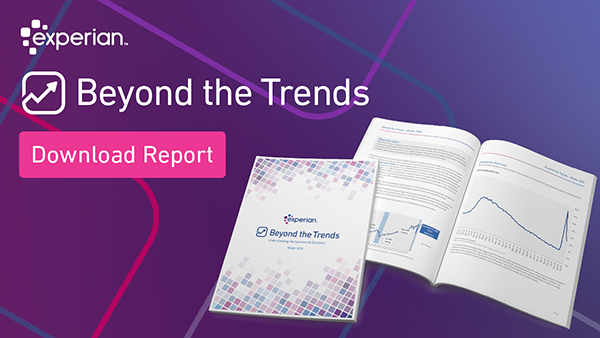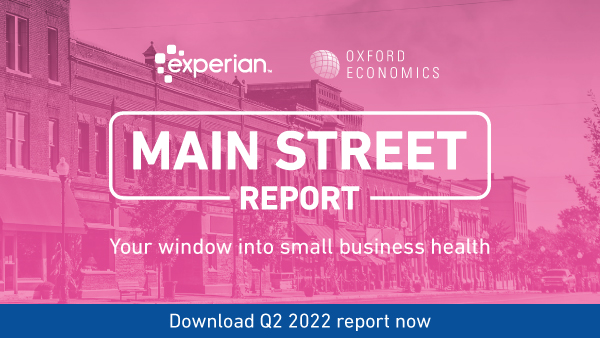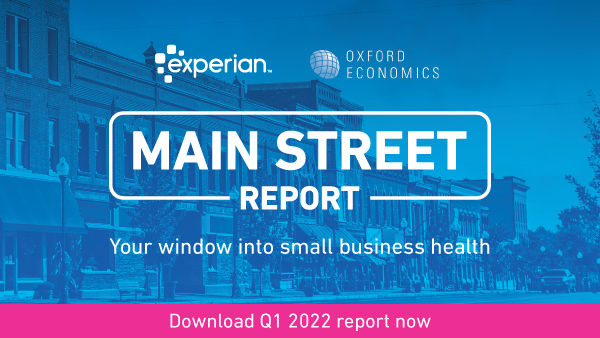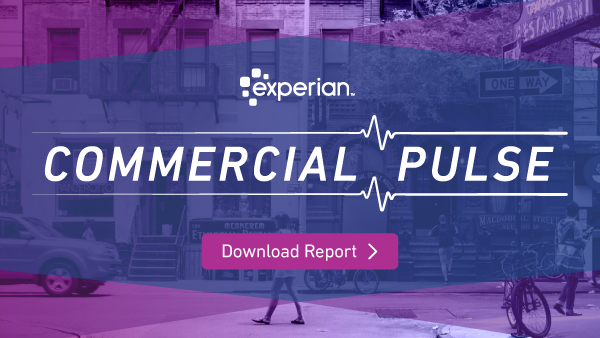Small Business Credit Insights

The Pandemic drove a tidal wave of small business creation, with over 5.4 million new small businesses in 2021 alone, and millions more this year. Now, the U.S. economy is continuing to change, but becoming more uncertain amid rising interest rates and worries over inflation. With the cost of money rising for small businesses, many are turning to different credit offerings to keep the cash flowing. Application fraud on the rise Some borrowers don’t always have good intentions, and credit issuers struggle to control fraud rates. If you manage risk for a financial institution, trade credit issuer or just want to understand the persistent wave of fraudulent small business applications you should attend our upcoming webinar. Attend our webinar A Perfect Storm for Business Credit RiskDate: Tuesday, November 29th, 2022Time: 10 a.m. Pacific | 1p.m. Eastern. In this talk, Experian's Fraud Products lead, Li Mao, is joined by Sr. Analytical Consultant Emily Garrett and Brian Stack, Experian's V.P. of Engineering Services, to discuss the fraud problem and what to do about it. Li Mao, Sr. Product Manager, Experian Fraud Solutions Emily Garrett, Sr. Analytical Consultant Manager, Experian Brian Stack, V.P. Engineering Services, Experian We'll cover: New business formation, how to assess younger businessesEconomic pressures on B2B's that you are not yet reading aboutStatistics on the gathering fraud storm3 tips for smooth sailing in your credit operations Register to attend

We are pleased to announce the publication of our Fall 2022 Beyond the Trends report. The Sales are coming!! Small businesses have been building inventory over the last year driven by fears that the global supply chain could break down at any moment. This anxiety created an environment of pre-ordering behavior intended to elevate the worry felt during the height of the pandemic that their business would fail not due to a lack of shoppers, but an empty shelf. Global economic environments change quickly, and our world is seeing heightened inflation. This increase in the price of goods and services is leading to softened consumer demand. Will holiday sales keep small business afloat before consumer behavior changes. Tough challenges for newer businesses and lenders Forty percent of small business have been operating for less than 1 year. These new businesses will be challenged by a tightening credit market, rising costs, and softening consumer demand. Commercial lenders are originating 13% less high risk subprime accounts since the 2021 even as through the door high risk inquiries have increased by 59%. Average credit lines on new commercial originations dropped 3% since the beginning of the pandemic as lenders look for growth while limiting exposure. In Q22022 those lines rose 1.4% as 40% less small businesses were accessing commercial credit. Download Fall 2022 Beyond the Trends Report

Experian and Oxford Economics have just released the Q2 Main Street Report. it offers a unique view of credit performance on millions of small businesses.

Mark your calendars! Experian and Oxford Economics will present key findings in the latest Main Street Report for Q2 2022 during the Quarterly Business Credit Review for Q2 2022. Kathy Bostjancic, Oxford's U.S. Chief Economist will share her take on Experian's most recent small business credit data and a macroeconomic outlook for the coming quarter. Brodie Oldham, Experian's V.P. of Commercial Data Science, will cover commercial credit trends. Q2 2022 Main Street Report The Q2 2022 Experian/Oxford Economics Main Street report is expected to release on August 23rd. If you are not already subscribed to thought leadership updates, be sure to sign up for updates on our Commercial Insights Hub. Mark Your Calendar Quarterly Business Credit Review Webinar Date: Wednesday, September 7th, 2022 Time: 10:00 a.m. (Pacific), 1:00 p.m. (Eastern) Why you should attend: Leading Experts on Commercial and Macro-Economic Trends Credit insights and trends on 30+ Million active businesses Ask our panel questions in real-time Industry Hot Topics Covered (Inclusive of Business Owner and Small Business Data) Commercial Insights you cannot get anywhere else Peer Insights with Interactive Polls (Participate) Discover and understand small business trends to make informed decisions Actionable takeaways based on recent credit performance Register To Attend

We're talking B2B marketing data hygiene with Tony Romero from our product team today on Business Chat.

Stagflation can impact your commercial portfolio performance. We explore options credit departments can take to identify high-risk accounts.

Experian has released the Summer 2022 Beyond the Trends report, our deep dive on the small business economy based on our commercial small business insights.

Experian and Oxford Economics have just released the Q1 2022 Main Street report, a window into the credit performance of small businesses complete with macroeconomic analysis. Highlights: The US economy contracted in Q1 for the first time since the pandemic-driven recession ended, but the domestic economy showed resilience in the face of Omicron, lingering supply constraints, and high inflation. Delinquency rates rose across the term periods; the 90+ days past due (DPD) climbed to 0.9 percent. Looking ahead, intensifying headwinds from more aggressive Fed tightening and tighter financial conditions will slow activity this year without stalling it. Download Q1 2022 Report Watch the Quarterly Business Credit Review Webinar Hear the experts from Experian and the lead economist from Oxford Economics unpack the latest Main Street Report. Watch the Quarterly Business Credit Review

Interest rate hike, flat unemployment rate, strong job growth are just a few of the trends we are following in the Commercial Pulse Report.
